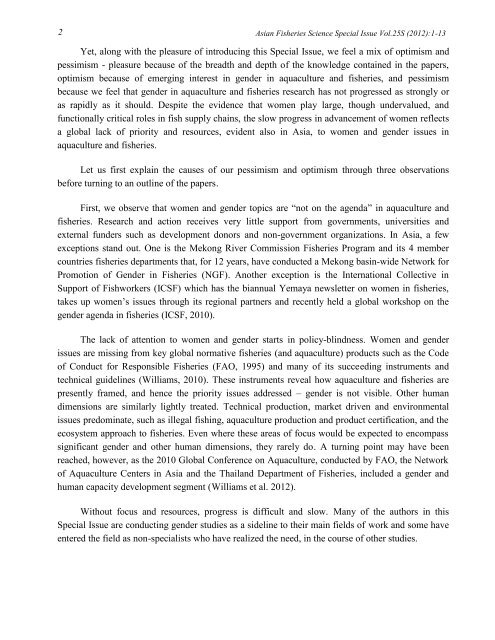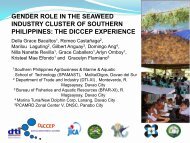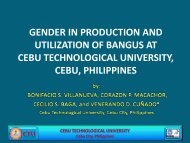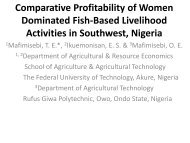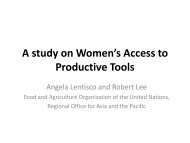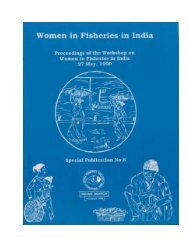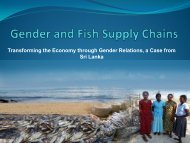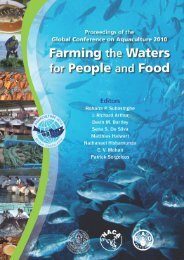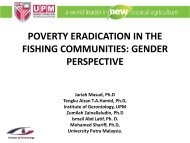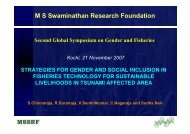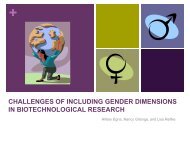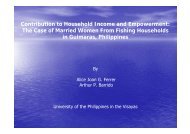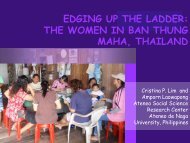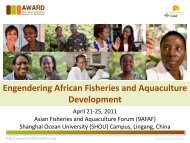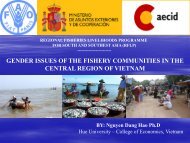Moving the Agenda Forward - GENDER IN AQUACULTURE AND ...
Moving the Agenda Forward - GENDER IN AQUACULTURE AND ...
Moving the Agenda Forward - GENDER IN AQUACULTURE AND ...
You also want an ePaper? Increase the reach of your titles
YUMPU automatically turns print PDFs into web optimized ePapers that Google loves.
2Asian Fisheries Science Special Issue Vol.25S (2012):1-13Yet, along with <strong>the</strong> pleasure of introducing this Special Issue, we feel a mix of optimism andpessimism - pleasure because of <strong>the</strong> breadth and depth of <strong>the</strong> knowledge contained in <strong>the</strong> papers,optimism because of emerging interest in gender in aquaculture and fisheries, and pessimismbecause we feel that gender in aquaculture and fisheries research has not progressed as strongly oras rapidly as it should. Despite <strong>the</strong> evidence that women play large, though undervalued, andfunctionally critical roles in fish supply chains, <strong>the</strong> slow progress in advancement of women reflectsa global lack of priority and resources, evident also in Asia, to women and gender issues inaquaculture and fisheries.Let us first explain <strong>the</strong> causes of our pessimism and optimism through three observationsbefore turning to an outline of <strong>the</strong> papers.First, we observe that women and gender topics are “not on <strong>the</strong> agenda” in aquaculture andfisheries. Research and action receives very little support from governments, universities andexternal funders such as development donors and non-government organizations. In Asia, a fewexceptions stand out. One is <strong>the</strong> Mekong River Commission Fisheries Program and its 4 membercountries fisheries departments that, for 12 years, have conducted a Mekong basin-wide Network forPromotion of Gender in Fisheries (NGF) . Ano<strong>the</strong>r exception is <strong>the</strong> International Collective inSupport of Fishworkers (ICSF) which has <strong>the</strong> biannual Yemaya newsletter on women in fisheries,takes up women’s issues through its regional partners and recently held a global workshop on <strong>the</strong>gender agenda in fisheries (ICSF, 2010).The lack of attention to women and gender starts in policy-blindness. Women and genderissues are missing from key global normative fisheries (and aquaculture) products such as <strong>the</strong> Codeof Conduct for Responsible Fisheries (FAO, 1995) and many of its succe eding instruments andtechnical guidelines (Williams, 2010). These instruments reveal how aquaculture and fisheries arepresently framed, and hence <strong>the</strong> priority issues addressed – gender is not visible. O<strong>the</strong>r humandimensions are similarly lightly treated. Technical production, market driven and environmentalissues predominate, such as illegal fishing, aquaculture production and product certification, and <strong>the</strong>ecosystem approach to fisheries. Even where <strong>the</strong>se areas of focus would be expected to encompasssignificant gender and o<strong>the</strong>r human dimensions, <strong>the</strong>y rarely do. A turning point may have beenreached, however, as <strong>the</strong> 2010 Global Conference on Aquaculture, conducted by FAO, <strong>the</strong> Networkof Aquaculture Centers in Asia and <strong>the</strong> Thailand Department of Fisheries, included a gender andhuman capacity development segment (Williams et al. 2012).Without focus and resources, progress is difficult and slow. Many of <strong>the</strong> authors in thisSpecial Issue are conducting gender studies as a sideline to <strong>the</strong>ir main fields of work and some haveentered <strong>the</strong> field as non-specialists who have realized <strong>the</strong> need, in <strong>the</strong> course of o<strong>the</strong>r studies.


